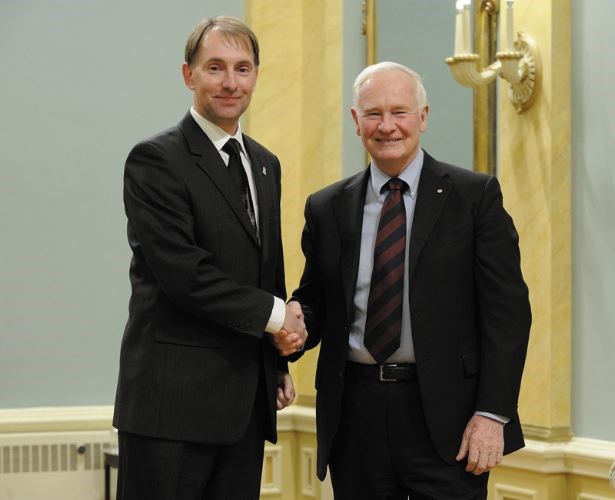UNBC professor Mark Shrimpton has received one of Canada's top awards for industrial academics from Governor General David Johnston.
Shrimpton shared in the 2013 Synergy Award for Innovation bestowed at Rideau Hall in Ottawa by the Governor General and administrated by the National Sciences and Engineering Research Council of Canada (NSERC).
"It's nice to be recognized for what has been an impressive collaboration that has existed for quite a long time," Shrimpton said.
Shrimpton was part of a team of researchers working at four study centres, one of which was UNBC, all focused on the chinook salmon being raised by Yellow Island Aquaculture on Quadra Island. This family-owned fish farm has been a working laboratory for the past 27 years. When Shrimpton was a student, he helped with some of the data collection there, and when he became a professor, he stayed involved in their ongoing science projects. His part of the research there has been going on since 1997.
This fish farm is special in many ways, he said, which makes it valuable to the scientific community.
"It is their willingness to ask questions and not just raise fish for profit. They want to try innovative ways to limit their impacts on the environment," he said.
The research over the years has led the fish farm to become an organic farm, to pioneer the practice of triploid sterilization (pressure-treating eggs in a way that ensures the fish inside are born sterile so they can't genetically mix with wild stocks if they escape the fish farm), to invest in fewer fish per enclosure, search for disease-resistant traits and meat production traits, and focus on indigenous chinook instead of the frequent farming practice of importing Atlantic salmon. All these steps, said Shrimpton, are carried out through carefully measured natural selection processes, instead of genetic modifications.
The results of the academic work, combined with the company's willingness to follow the hypotheses of the researchers, has improved company performance. License capacity at the farm has increased from 135 to 750 tonnes per year, and revenues have increased fivefold since Yellow Island Aquaculture started. In nearly three decades of operation, no fish have escaped and no impacts on wild stocks or the neighbouring ecosystem have been detected. The farm has demonstrated increased fish production, decreased mortality in rearing stocks, a longer growing season, and an overall increase in revenues.
With wild fish stocks in need of careful management and in some cases threatened with extinction, and more global demand for fish, fish farming is seen as a possible way to boost international sustenance and nutrition. It is an industry that also presents its own problems, however, if each farm is not carefully operated.
In Canada it is still a fledgling industry with plenty of consumer interest but policies are still evolving for environmental safety and production standards. It is the work of Shrimpton and researchers like him that are shaping the conversation.
“One of our goals at UNBC is to strengthen and foster the connections between research, industry, and communities," said UNBC's vice-president of research Ranjana Bird. "Research and innovation are instrumental to enhancing regional prosperity and wellbeing. Dr. Shrimpton’s work is a perfect example of just such collaboration and I congratulate him on his success.”



